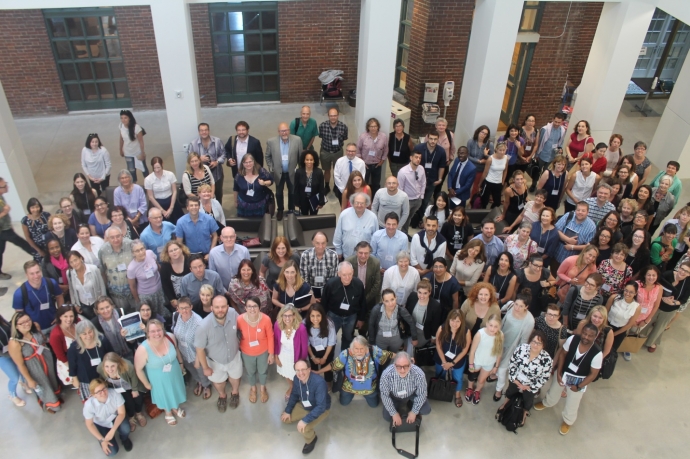First international conference hosted in the new Jackman Law Building: attendees of the joint International Journal of Clinical Legal Education (IJCLE) and Association for Canadian Clinical Legal Education (ACCLE) conference in the Osler Hoskin and Harcourt LLP Atrium.
By Geneviève Ryan, Summer Research Assistant at the David Asper Centre for Constitutional Rights / Photos by Ejona Xega
The state-of-the-art Jackman Law Building has already hosted its first international conference. Earlier this month, the Faculty of Law hosted the joint International Journal of Clinical Legal Education (IJCLE) and Association for Canadian Clinical Legal Education (ACCLE) conference, from July 10-12, 2016. This year’s theme was “The Risks and Rewards of Clinical Legal Education Programs”. It was the largest such conference ever hosted by the Faculty of Law, with guests and speakers representing 18 countries and more than 40 universities worldwide.
Conference organizers Cheryl Milne (executive director, Asper Centre for Constitutional Rights) and Lisa Cirillo (director, Downtown Legal Services) welcomed all 226 participants to the new Jackman Law Building. Meals and receptions were taken in the spacious, sky-lit atrium at the heart of the building, with guests often stepping out to a pavilion on the Faculty’s back lawn in the open air and summer sun. Conference participants escaped the heat in breakout panels and seminars, held in the air-conditioned and spacious new Moot Court, as well as in various newly-finished classrooms throughout the building.

Conference organizers (from left to right) Jonny Hall (Northumbria University), Lisa Cirillo (President of ACCLE and Executive Director of Downtown Legal Services), Dr. Elaine Hall (Northumbria University and editor of the IJCLE) and Cheryl Milne (Executive Director of the Asper Centre).
The first official event of the conference was a keynote speech by Sarah Buhler, assistant professor at the University of Saskatchewan College of Law. Her speech on ‘Clinics in a Dangerous Time’ situated the purpose and role of legal clinics in the current global climate. Focusing on local impacts of world events – including environmental crises, economic collapse and ongoing wars – she highlighted the particular challenges for law students, clinical lawyers and their community allies. Her optimistic and hopeful message also focused on the opportunities for clinics to be sites of active, innovative and imaginative justice practices in this complex context.
The second day’s keynote presentation was given by Adrian Evans, professor at Monash University Faculty of Law, in Australia, and joined by co-presenters Ross Hyams and Dr. Kate Seear, senior lecturers, Monash University Faculty of Law. Together they role-played the debate within clinics when clinicians and directors adopt different approaches on the proper course of action to be taken on behalf of clinic clients. The presentation was rounded out by an interactive discussion with the audience on the managerial, professional and ethical questions engaged by these debates, and the potential risks and rewards of exposing clinical students to this complex ethical terrain.
Over the three days, in nearly 40 concurrent sessions, the conference covered topics as wide-ranging as community engagement, clinical pedagogy, and specialized clinics such as family law, discrimination law and women’s legal clinics, from both a Canadian and international perspective.
In a panel with the theme of ‘Unmet Need’ Lucy Yeatman of University of Greenwich, UK, discussed the increase in self-representation in family courts after legal aid reductions in England and Wales, and the professional and ethical implications of rendering assistance to self-represented litigants through student legal clinics. This session complemented a seminar run by Nikki Gershbain, national director of Pro Bono Students Canada, Julie Macfarlane and Mackenzie Falk, University of Windsor, Heather de Berdt Romilly, from The Legal Information Society, Nova Scotia, and Jana Saracevic, from the National Self-Represented Litigant Support Network, Canada, on coaching self-represented litigants in the Canadian context. Panelists discussed coaching models and their own experiences as self-represented litigants, and the audience engaged with how they themselves might assist self-represented litigants in scenarios put to them by the presenters.
The role of legal clinics globally was highlighted in a number of inspiring presentations, including from Professors Patrizia de Cesari and Chiara Di Stasio, from the University of Brescia, Italy, on the student experience of an Asylum and Immigration clinic in the current refugee crisis, including the challenges of evidence-gathering, addressing clients’ trauma, and cross-cultural communication. In the same presentation Professors Mirja Trilsch and Elise Hansbury, University of Quebec at Montreal, discussed the challenges to clinical legal research in an international human rights setting and the potential impact of that research vis-à-vis national and international decision-makers, illustrating their discussion with examples of student advocacy work on violence against women in St. Vincent and the Grenadines before the UN CEDAW.
These and many more of the discussions were not limited to the physical space of the Jackman Law Building. Participants and panelists live-tweeted their experiences and discussions throughout under the hashtags #IJCLE16 and #ACCLE, bringing the conference to the public stage.
Click this link to visit the Asper Centre’s Storify highlights of the Conference. The discussion will continue with the publication of papers presented over the course of the conference in an upcoming special issue of the IJCLE.


